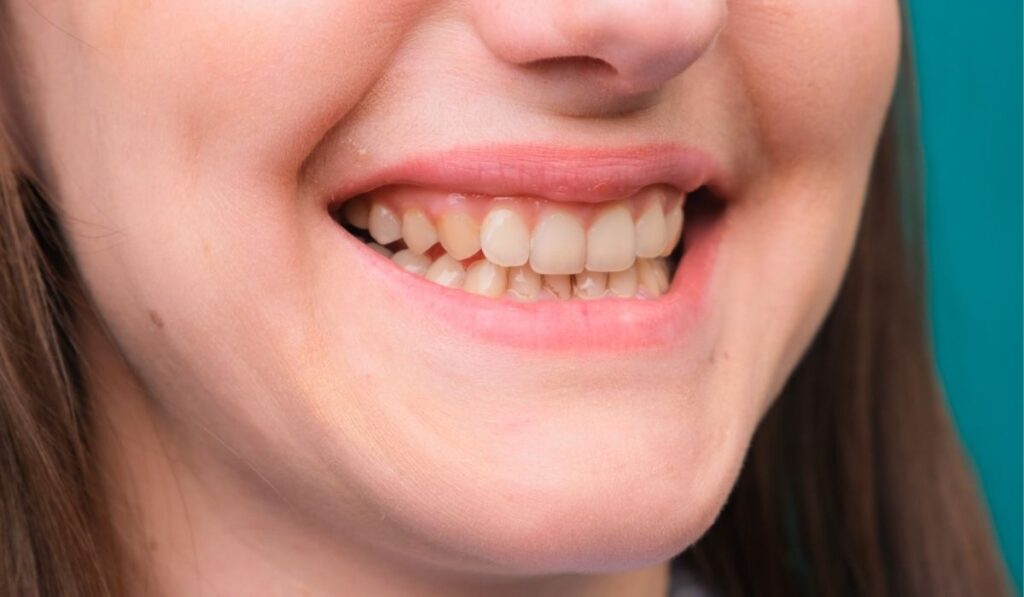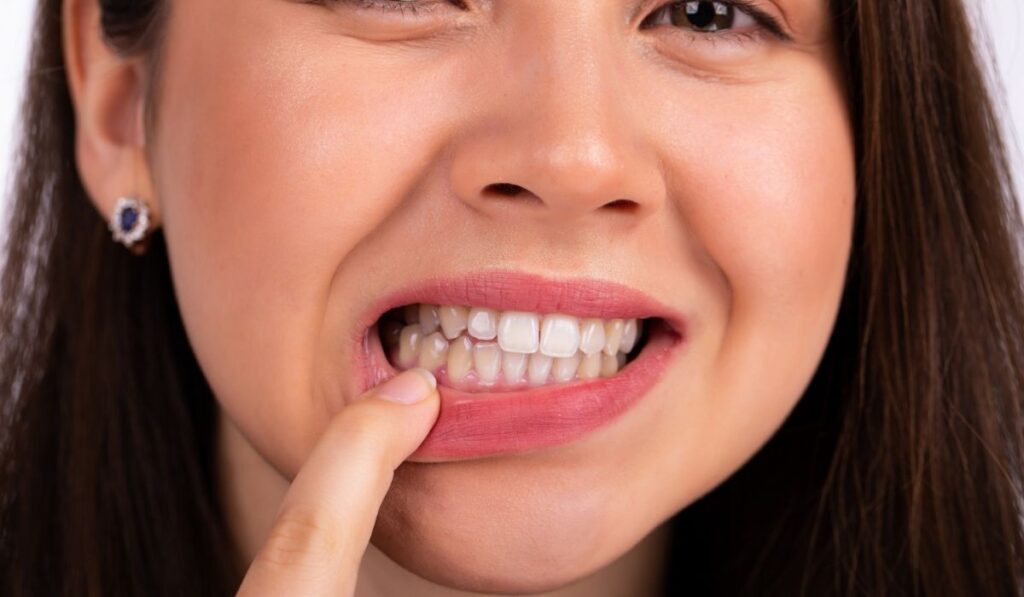Many things can cause the yellowing of teeth. The factors could be age-related, genetic, or more often than not it’s related to what you’re eating and drinking. The basic thing to understand here is that while yellowing arising from lifestyle and food choices can easily be addressed, teeth yellowing caused by other things is difficult to correct.
Teeth staining can be caused by consuming alcohol, coffee, citrus fruits, juices, and soft drinks regularly. Other potential causes include thinning enamel or even genetics. Many stains can be removed at home over time with baking soda, or hydrogen peroxide, or teeth whitening kits.
No matter what causes your teeth to yellow, there are simple and effective methods you can use to address the issue. These methods include the use of oil pulling, hydrogen peroxide, and baking soda. Each method requires special care, so let’s take a look at the details before you begin.
Why Are My Teeth Stained and Yellow?

Teeth yellowing can be caused by many factors, including your personal eating and brushing habits. Alcohol, smoking, coffee intake and even genetics play huge roles in the staining of teeth. Certain foods, especially those that are high in tannins, like red wine, can easily contribute to the yellowing of teeth.
Other foods that stain the teeth include citrus fruits, juices, coffee, berries, soft drinks, curry, balsamic vinegar, tomato-based sauces, and soy sauces.
It is also noteworthy that yellowing of teeth can occur from thinning enamel. There is no way to restore lost enamel, and you can’t change the color of the dentin, which is naturally yellow.
Fluorosis, meanwhile, is an irreversible condition resulting from excessive ingestion of fluoride during the years of tooth formation. The fluoride damages the enamel-forming cells, leading to mineralization disorder, which increases sub-surface enamel that makes the teeth turn dingy yellow.
Types of Teeth Stains
Many things can cause the discoloration of the teeth but there are also different sources of stains affecting your teeth. This is important because the treatment of teeth discoloration will depend on the cause of the yellowing. Teeth stains come in three types: intrinsic, extrinsic, and age-related.
The extrinsic tooth stains can occur when the outer layer of the tooth, the enamel, is stained by diet and lifestyle choices such as smoking, wine, cola, coffee, and food intake. This type of stain shows on the outside of the tooth and can cause yellowing of the teeth.
Intrinsic teeth stains occur to the inside of the tooth, or the dentin. These stains are primarily caused by trauma, injury, certain medications, teeth decay, and the excessive use of fluoride. This type of stain is difficult to remove because it is ingrained in the tooth structure.
Age-related teeth stains arise from both the intrinsic and extrinsic causes of teeth stains. While food, drinks, medications, and lifestyle can yellow your teeth, the enamel can also yellow due to age as the outer layer of the tooth gets thinner and allows the yellowed dentin to become more obvious.
Why Are My Teeth Yellow Even if I Take Great Care of Them?
Sometimes, despite your efforts to prevent the yellowing of teeth by brushing regularly, you still have yellow teeth. Frequent flossing and brushing can limit stains, but some yellowing may be due to aging, genetics, and unavoidable medications.
Your overall health status, especially nutritional deficiencies and treatments, could make your teeth yellow despite your brushing and oral care. Your best bet is to try to remove the yellow stains.
Proper oral health is vital. Brushing twice a day is the minimum, and dental floss can help you reach those parts that your brush couldn’t.
You must be careful with the way you brush your teeth because you risk eroding your teeth enamel, which can reveal the dentin layer and result in discoloration.
Tooth discoloration is also caused by certain medications. Medications used in the treatment of major health issues such as high blood pressure, asthma, and allergies can cause yellowing of the teeth.
How Can I Remove Teeth Stains?

If you have yellow teeth, you don’t need to go to your dentist. There are a few home remedies you can use to get rid of yellow stains on your teeth.
Some popular options include coconut oil, apple cider vinegar, activated charcoal, baking powder, and hydrogen peroxide. The peels of lemons, oranges, and bananas, with their whitening properties, can also be helpful. Let’s take a closer look at a few options:
Oil Pulling
Oil pulling, which is when you swish oil around in your mouth to remove bacteria capable of turning into plaque and causing teeth yellowing, is instrumental to removing teeth stains. Coconut oil is very useful, especially because of its pleasant smell and other health benefits.
Put one tablespoon of a high-quality coconut oil, such as this Organic Liquid Coconut Oil (on Amazon), in your mouth and push and pull the oil through your teeth. You may need to wait for some seconds to allow it to melt and then pull for close to 20 minutes.
Brush With Baking Soda
The whitening properties of baking soda, which is a crucial ingredient in commercial toothpaste, are effective. With a mild abrasion, the stains can be removed. Studies have shown that brushing with baking soda toothpaste is very effective in removing stains.
The higher the concentration of the baking soda, the more the whitening effect on the teeth. You can simply mix one tablespoonful of baking soda into two spoonfuls of water and brush your teeth with the paste. Repeat a few times a week.
Use Hydrogen Peroxide
Hydrogen peroxide has a natural bleaching agent that kills bacteria in the mouth and has been used as a disinfectant. A finding revealed that toothpaste containing hydrogen peroxide and baking soda, such as this Colgate toothpaste (on Amazon), has a significant whitening effect on the teeth.
However, the safety concerns of using hydrogen peroxide must be taken into account. The recommendation is to dilute it with water, because frequent use of hydrogen peroxide alone can be carcinogenic. A diluted concentration may be safe but can still cause tooth sensitivity and irritation.


